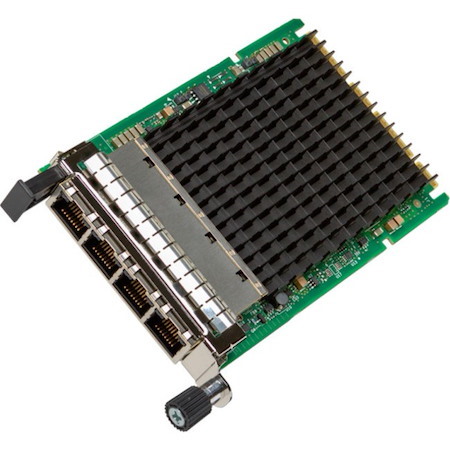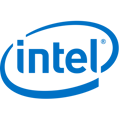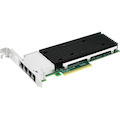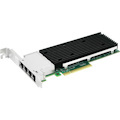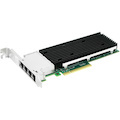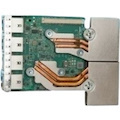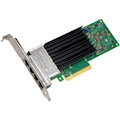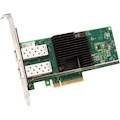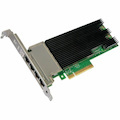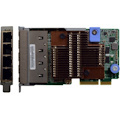Simplify technology transitions with the Intel® Ethernet Network Adapter X710-T2L and X710-T4L for OCP 3.0. Autonegotiation between port speeds provides maximum flexibility in dual and quad-port 10GBASE-T configurations.These low-power adapters also support Energy Efficient Ethernet to efficiently reduce power consumption during periods of low data activity.
The X710-T2L and X710-T4L for OCP 3.0 are part of the Intel® Ethernet 700 Series, the foundation for server connectivity; providing broad interoperability, critical performance optimizations, and increased agility for Communications, Cloud, and Enterprise IT network solutions.
- Interoperability - Multiple speeds and media types for broad compatibility backed by extensive testing and validation.
- Optimization - Intelligent offloads and accelerators to unlock network performance in servers with Intel® Xeon® processors.
- Agility - Both Kernel and Data Plane Development Kit (DPDK) drivers for scalable packet processing.
The OCP NIC 3.0 specification defines a standardized design for a new generation of network adapters. Simple and straightforward form factors, clear manageability requirements, and improved serviceability help simplify deployment for current and emerging capabilities.
All Intel® Ethernet 700 Series Network Adapters include these feature-rich technologies:
Flexible and Scalable I/O for Virtualized Infrastructures
Intel® Virtualization Technology (Intel® VT), delivers outstanding I/O performance in virtualized server environments.
I/O bottlenecks are reduced through intelligent offloads, enabling near-native performance and VM scalability. These offloads include Virtual Machine Device Queues (VMDq) and Flexible Port Partitioning using SR-IOV with a common Virtual Function driver for networking traffic per Virtual Machine (VM). Host-based features supported include:
VMDQ for Emulated Path: VMDQ, enables a hypervisor to represent a single network port as multiple network ports that can be assigned to the individual VMs. Traffic handling is offloaded to the network controller, delivering the benefits of port partitioning with little to no administrative overhead by the IT staff.
SR-IOV for Direct Assignment: Adapter-based isolation and switching for various virtual station instances enables optimal CPU usage in virtualized environments.
- Up to 128 virtual functions (VFs), each VF can support a unique and separate data path for I/O related functions within the PCI Express hierarchy.
- Use of SR-IOV with a networking device, for example, allows the bandwidth of a single port (function) to be partitioned into smaller slices that can be allocated to specific VMs or guests, via a standard interface.
Intel® Ethernet Adaptive Virtual Function (Intel® Ethernet AVF): Customers deploying mass-scale VMs or containers for their network infrastructure now have a common VF driver. This driver eases SR-IOV hardware upgrades or changes, preserves base-mode functionality in hardware and software, and supports an advanced set of features in the Intel® Ethernet 700 Series.
- General Information
- Manufacturer
- Intel Corporation
- Manufacturer Website Address
- http://www.intel.com
- Brand Name
- Intel
- Product Series
- 700
- Package Type
- Retail
- Product Type
- 10Gigabit Ethernet Card
- Technical Information
- Chipset Manufacturer
- Intel
- Chipset Model
- X710-TM4
- Interfaces/Ports
- Host Interface
- PCI Express 3.0 x8
- Total Number of Ports
- 4
- Number of Network (RJ-45) Ports
- 4
- Media & Performance
- Media Type Supported
- Twisted Pair
- Maximum Data Transfer Rate
- 10 Gbit/s
- Network & Communication
- Network Technology
- 10GBase-T
- Physical Characteristics
- Color Family
- Multicolor
- Product Color
- Black
- Green
- Silver
- Form Factor
- Plug-in Card
- Bracket Height
- OCP
- Miscellaneous
- Application/Usage
- Network
- Device Supported
- Server
- Environmentally Friendly
- Yes
- Environmental Compliance
- Restriction of Hazardous Substances (RoHS)

